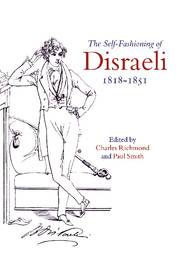Book contents
- Frontmatter
- Contents
- List of contributors
- Preface
- Introduction
- 1 Disraeli's education
- 2 Disraeli's romanticism: self-fashioning in the novels
- 3 Disraeli's crucial illness
- 4 Disraeli and orientalism
- 5 ‘A Hebrew to the end’: the emergence of Disraeli's Jewishness
- 6 Disraeli's interpretation of English history
- 7 Disraeli's politics
- Notes
- Index
4 - Disraeli and orientalism
Published online by Cambridge University Press: 19 March 2010
- Frontmatter
- Contents
- List of contributors
- Preface
- Introduction
- 1 Disraeli's education
- 2 Disraeli's romanticism: self-fashioning in the novels
- 3 Disraeli's crucial illness
- 4 Disraeli and orientalism
- 5 ‘A Hebrew to the end’: the emergence of Disraeli's Jewishness
- 6 Disraeli's interpretation of English history
- 7 Disraeli's politics
- Notes
- Index
Summary
‘But the question is, what is the Eastern question?’ (Consul-General Laurella in Tancred, V, ii)
‘The East is a career’ (Tancred, II, xiv). Quoting this epigram in the introduction to Orientalism, Edward Said adds: Disraeli ‘meant that to be interested in the East was something bright young Westerners would find to be an all-consuming passion’. Further, through such a career ‘one could remake and restore not only the Orient but also oneself’. As Said implies, Disraeli certainly ‘remade and restored’ his own career via the Orient, albeit in the complicated, paradoxical ways I explore in this chapter. In a sense, Disraeli was not just an orientalist; he was also a self-made oriental. The aspiring young writer and politician dreamed in at least two contrary ways about the Orient: in Alroy, Contarini Fleming, and Tancred, Disraeli fantasized about replacing Ottoman with British rule over the Near East; but even more significantly, he fantasized about himself as an oriental – a ‘Semite’ of aristocratic blood who was the equal of any Ottoman or, for that matter, British ruler. In short, while in a general way the young Disraeli chimed in with others' orientalist schemes for imperializing and perhaps westernizing Asia, he was simultaneously orientalizing himself.
From childhood, as his novels and letters attest, much of Disraeli's fantasy life revolved around the Orient. But for the future prime minister, fantasy had a way of becoming reality; far more than for other, less imaginative statesmen, what Disraeli thought and felt about ‘the great Asian mystery’ (Tancred, II, xi) influenced modern history both in Britain and abroad, in the Orient itself.
- Type
- Chapter
- Information
- The Self-Fashioning of Disraeli, 1818–1851 , pp. 90 - 105Publisher: Cambridge University PressPrint publication year: 1999



